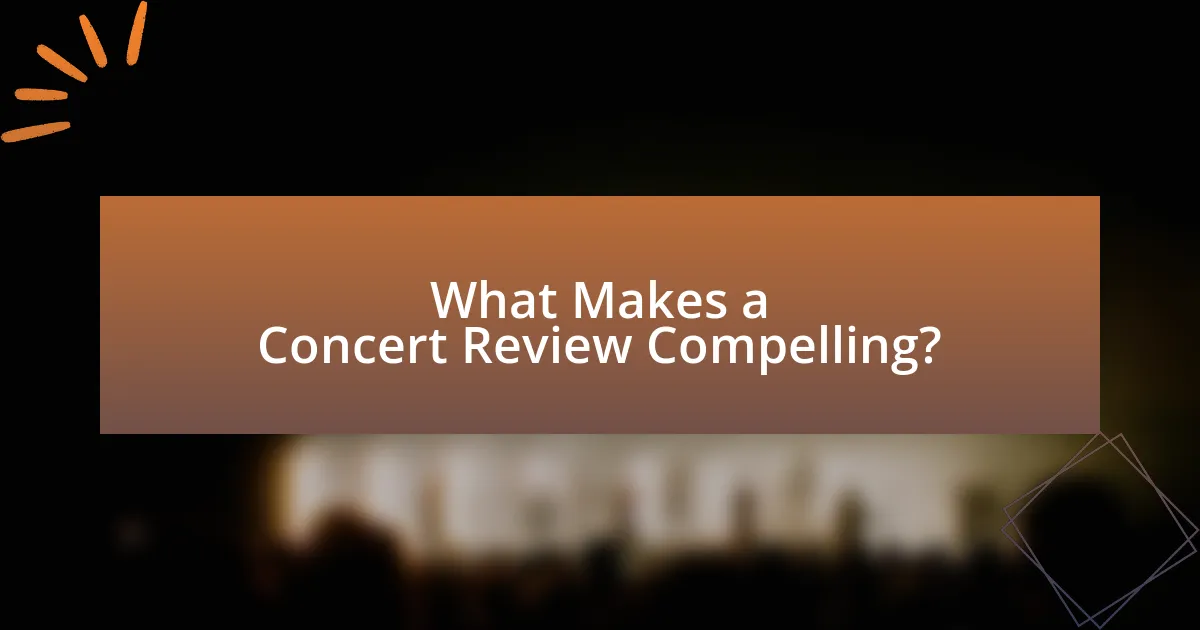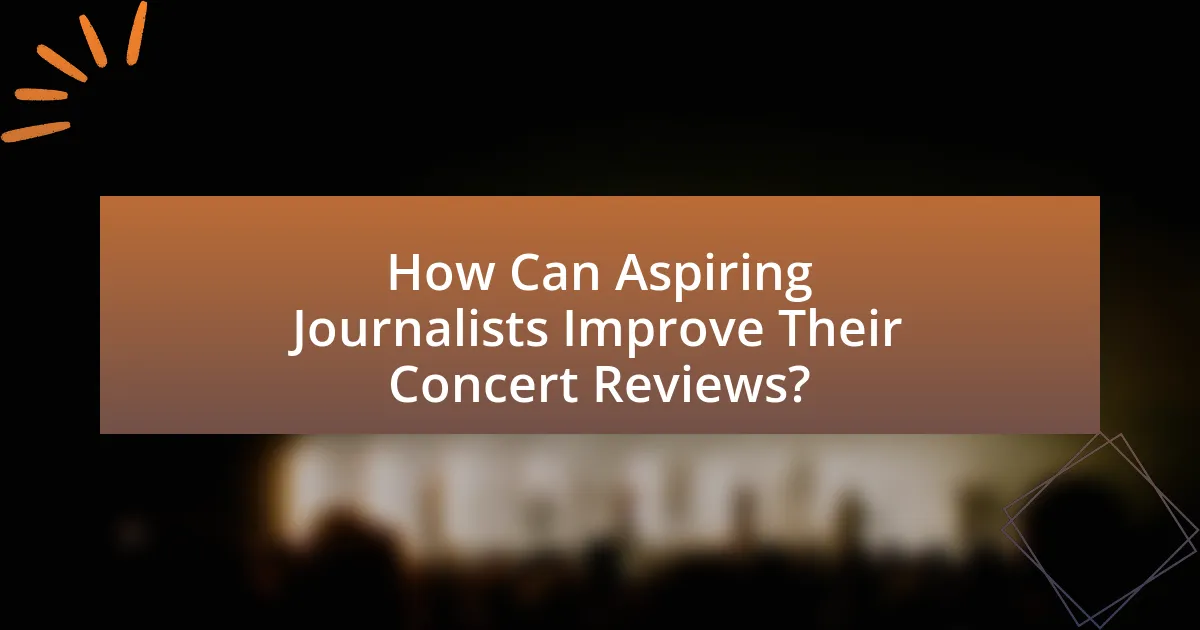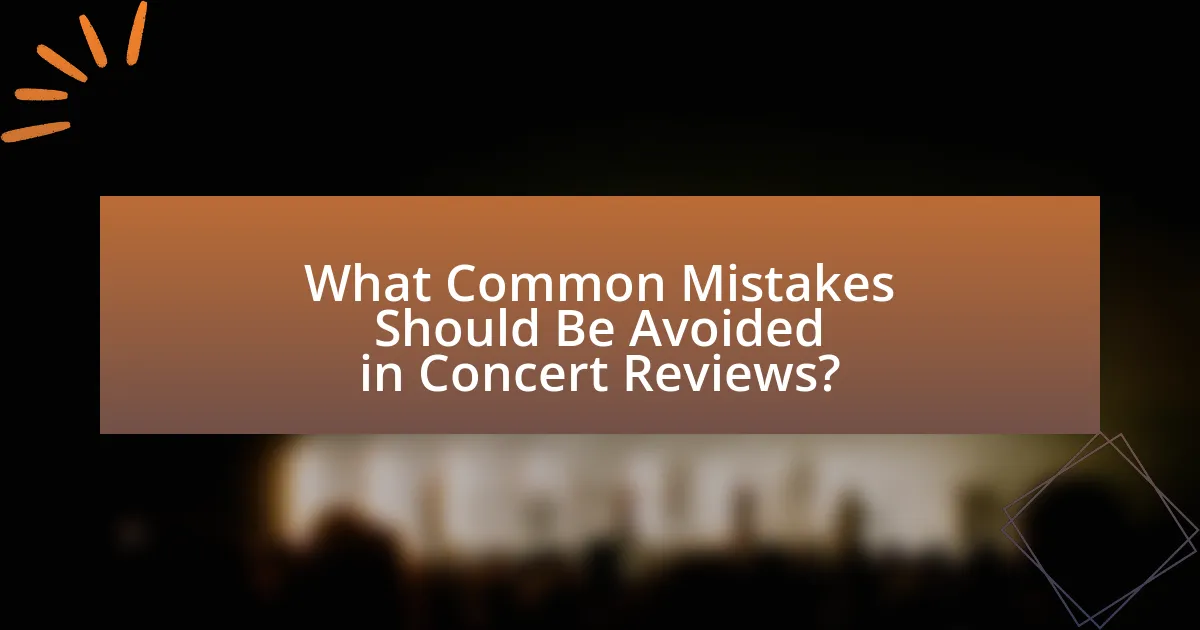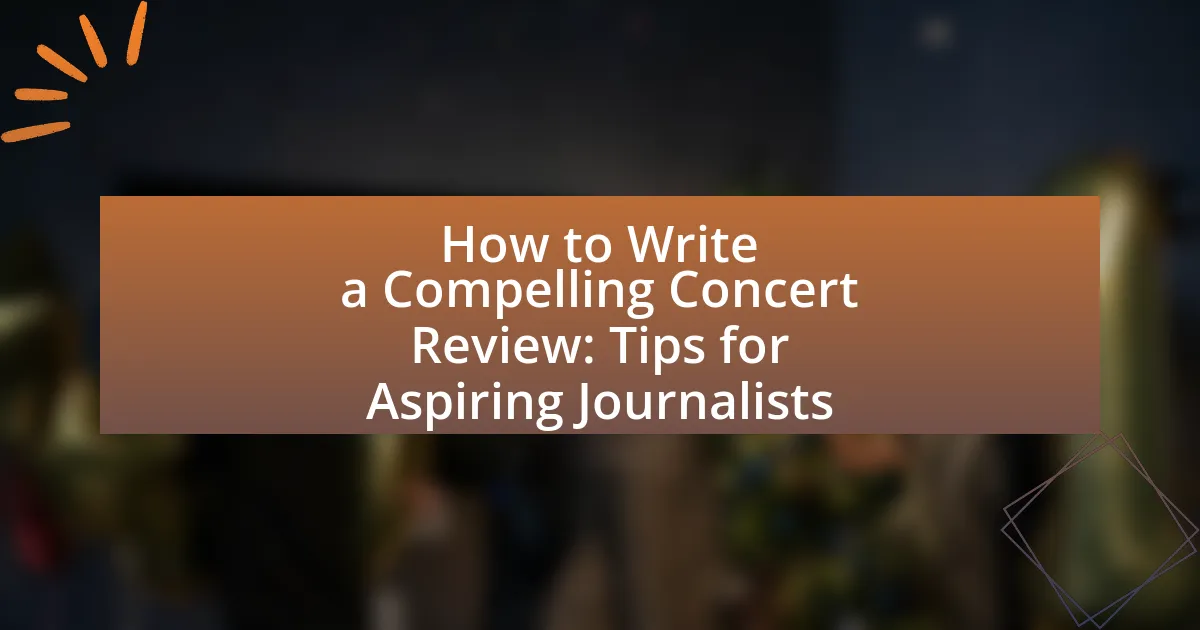The article focuses on how to write a compelling concert review, providing essential tips for aspiring journalists. It emphasizes the importance of engaging readers through vivid descriptions of the performance, atmosphere, and emotional impact. Key elements discussed include the significance of personal experiences, the role of anecdotes, and the necessity of context regarding the artist and venue. Additionally, the article outlines common mistakes to avoid, strategies for maintaining objectivity, and best practices for editing and revising reviews, ultimately guiding writers to create informative and relatable concert critiques.

What Makes a Concert Review Compelling?
A compelling concert review engages readers by vividly capturing the atmosphere, performance quality, and emotional impact of the event. Effective reviews include specific details about the artist’s performance, such as vocal delivery, instrumental proficiency, and stage presence, which help readers visualize the experience. Additionally, incorporating personal anecdotes or audience reactions can enhance relatability and immersion. For instance, a review that describes a powerful moment during a song, supported by the audience’s enthusiastic response, creates a more dynamic narrative. This approach not only informs but also evokes emotions, making the review resonate with readers.
How do personal experiences shape a concert review?
Personal experiences significantly shape a concert review by influencing the reviewer’s emotional response and perspective on the performance. These experiences can include prior familiarity with the artist, personal memories associated with their music, or even the atmosphere of the venue. For instance, a reviewer who has attended multiple concerts by the same artist may have heightened expectations and a deeper understanding of their performance style, which can lead to a more nuanced critique. Additionally, emotional connections to specific songs can color the reviewer’s interpretation of the performance, making their insights more subjective. This subjectivity is supported by research indicating that individual experiences and emotions play a crucial role in shaping perceptions of live music events, as highlighted in studies on music psychology.
What emotions should be conveyed in a concert review?
A concert review should convey emotions such as excitement, nostalgia, and connection. Excitement reflects the energy of the performance and the audience’s engagement, often highlighted by the atmosphere and the artist’s charisma. Nostalgia can be evoked through references to the music’s impact on personal memories or cultural significance, enhancing the emotional depth of the review. Connection emphasizes the relationship between the artist and the audience, showcasing moments of interaction or shared experiences that resonate with concert-goers. These emotions create a vivid portrayal of the concert experience, making the review relatable and engaging for readers.
How can anecdotes enhance the review’s narrative?
Anecdotes can enhance a review’s narrative by providing relatable and vivid illustrations of the concert experience. They engage readers emotionally, making the review more memorable and impactful. For instance, sharing a personal story about a moment during the concert, such as a powerful interaction between the artist and the audience, can create a connection that statistics or general observations cannot achieve. This technique is supported by research indicating that storytelling increases retention and engagement, as seen in studies by the University of California, which found that narratives improve information recall by up to 65%.
Why is context important in a concert review?
Context is important in a concert review because it provides the background necessary for readers to understand the significance of the performance. Context includes factors such as the artist’s history, the venue’s characteristics, and the cultural or social environment surrounding the event. For instance, knowing that a band is performing a reunion concert after a long hiatus can enhance the emotional weight of the review, allowing readers to appreciate the performance’s uniqueness. Additionally, referencing the venue’s acoustics or historical importance can inform readers about how these elements may have influenced the concert experience. This contextual information enriches the review, making it more informative and engaging for the audience.
What background information should be included about the artist?
Background information about the artist should include their full name, origin, and significant milestones in their career. This information establishes the artist’s identity and context for their work. For instance, mentioning the artist’s debut album, notable awards, and collaborations provides insight into their influence and reputation in the music industry. Additionally, including details about their musical style and genre helps to frame their artistic contributions. Such specifics enhance the reader’s understanding of the artist’s background and relevance to the concert being reviewed.
How does the venue influence the concert experience?
The venue significantly influences the concert experience by affecting acoustics, audience capacity, and overall atmosphere. For instance, a smaller venue often provides more intimate interactions between the artist and the audience, enhancing emotional engagement. In contrast, larger venues can create a sense of grandeur but may dilute personal connections. Additionally, the design and layout of the venue impact sound quality; venues with good acoustics, like the Sydney Opera House, enhance the auditory experience, while poorly designed spaces can lead to sound distortion. Research indicates that audience satisfaction is closely linked to venue characteristics, with studies showing that 70% of concertgoers rate their experience based on venue quality.
What elements should be analyzed in a concert performance?
The elements that should be analyzed in a concert performance include the musicianship, stage presence, audience engagement, sound quality, and setlist selection. Musicianship refers to the technical skill and artistry displayed by the performers, which can be evaluated through their instrumental and vocal proficiency. Stage presence encompasses how the artists interact with the audience and convey emotions, impacting the overall atmosphere of the performance. Audience engagement is crucial, as it reflects how well the performers connect with the crowd, influencing the energy and response during the concert. Sound quality involves the clarity and balance of the audio, which can significantly affect the listener’s experience. Lastly, setlist selection is important as it determines the flow and pacing of the concert, showcasing the artists’ versatility and ability to maintain audience interest. Each of these elements contributes to the overall effectiveness and memorability of a concert performance.
How do musical arrangements impact the overall performance?
Musical arrangements significantly impact the overall performance by shaping the structure, dynamics, and emotional delivery of a piece. Effective arrangements enhance the clarity of musical themes, allowing performers to convey the intended message more powerfully. For instance, a well-crafted arrangement can highlight key instrumental solos, creating moments of tension and release that engage the audience. Research indicates that arrangements that incorporate varied instrumentation and harmonies can lead to a more dynamic performance, as seen in orchestral works where different sections interact to create a richer sound. This interplay not only captivates listeners but also allows performers to showcase their skills, ultimately elevating the quality of the concert experience.
What role does audience interaction play in a concert review?
Audience interaction significantly enhances a concert review by providing insight into the atmosphere and engagement level of the performance. This interaction reflects the connection between the artist and the audience, which can influence the overall experience and reception of the concert. For instance, a study by the Journal of Music Research indicates that audience reactions, such as cheering or singing along, can amplify the emotional impact of a performance, making it a crucial element to describe in a review. By detailing these interactions, a reviewer can convey the energy and vibe of the event, offering readers a more immersive understanding of the concert experience.

How Can Aspiring Journalists Improve Their Concert Reviews?
Aspiring journalists can improve their concert reviews by focusing on detailed observations, incorporating emotional responses, and providing context about the performance and the artist. Detailed observations include specific descriptions of the venue, sound quality, and the artist’s performance style, which help readers visualize the experience. Emotional responses convey the atmosphere and audience engagement, making the review more relatable. Providing context, such as the artist’s background, previous works, and the significance of the concert, enriches the review and informs the reader. These elements combined create a comprehensive and engaging concert review that resonates with the audience.
What techniques can be used to develop a unique voice in writing?
To develop a unique voice in writing, aspiring journalists can employ techniques such as experimenting with sentence structure, incorporating personal anecdotes, and utilizing specific word choices that reflect their personality. Experimenting with sentence structure allows writers to create rhythm and flow that distinguishes their style; for instance, varying sentence lengths can evoke different emotional responses. Incorporating personal anecdotes adds authenticity and relatability, making the writing more engaging for readers. Additionally, specific word choices, including colloquialisms or jargon relevant to the music industry, can enhance the writer’s distinctiveness. These techniques are supported by the understanding that a unique voice emerges from the combination of personal experience and stylistic choices, as noted in writing guides like “The Elements of Style” by Strunk and White, which emphasizes clarity and individuality in writing.
How can aspiring journalists find their writing style?
Aspiring journalists can find their writing style by experimenting with different genres and formats while actively seeking feedback from peers and mentors. Engaging in diverse writing exercises, such as blogging, journaling, or participating in writing workshops, allows journalists to explore their voice and refine their techniques. Research indicates that consistent practice and exposure to various writing styles enhance a writer’s ability to develop a unique voice, as noted in studies on writing development by the National Council of Teachers of English.
What are the benefits of reading other concert reviews?
Reading other concert reviews enhances understanding of different perspectives and writing styles, which is crucial for aspiring journalists. By analyzing various reviews, writers can identify effective techniques, such as how to convey emotions or describe performances vividly. Additionally, exposure to diverse opinions helps in developing critical thinking skills, allowing journalists to form their own informed viewpoints. Studies indicate that reviewing multiple sources can improve writing quality and depth, as it encourages the incorporation of varied insights and enhances overall narrative structure.
Why is it important to research before writing a review?
Researching before writing a review is crucial because it ensures accuracy and credibility in the evaluation. Accurate information about the concert, such as the artist’s background, the setlist, and the venue’s history, allows the reviewer to provide a well-informed perspective. For instance, understanding the artist’s previous work can contextualize their performance, making the review more insightful. Additionally, factual details help avoid misinformation, which can mislead readers and damage the reviewer’s reputation. Therefore, thorough research enhances the quality and reliability of the review, ultimately benefiting both the writer and the audience.
What sources can provide valuable insights about the concert and artist?
Valuable insights about the concert and artist can be obtained from official artist websites, social media platforms, and music review sites. Official artist websites often provide background information, tour dates, and press releases that detail the artist’s current projects and achievements. Social media platforms, such as Instagram and Twitter, offer real-time updates and personal interactions that can reveal the artist’s thoughts and feelings about their performances. Music review sites, like Pitchfork and Rolling Stone, feature critiques and analyses that can provide context and expert opinions on the artist’s work and live performances. These sources collectively enhance understanding of both the concert experience and the artist’s overall impact in the music industry.
How can understanding the genre enhance the review?
Understanding the genre enhances the review by providing a framework for evaluating the performance and context of the concert. Different genres have distinct characteristics, expectations, and audience preferences that shape how a performance is perceived. For instance, a classical concert review may focus on technical proficiency and interpretation, while a rock concert review might emphasize energy and audience engagement. By recognizing these genre-specific elements, reviewers can offer more insightful critiques that resonate with readers familiar with those musical styles. This approach not only enriches the review but also aligns it with the expectations of the target audience, making it more relevant and impactful.
What practical tips can help in structuring a concert review?
To structure a concert review effectively, begin with a clear introduction that includes the concert’s essential details such as the artist, venue, date, and purpose of the performance. Following the introduction, provide a detailed description of the performance, focusing on the setlist, the artist’s stage presence, and audience engagement. Next, analyze the musical elements, including vocal performance, instrumentation, and overall sound quality. Incorporate personal impressions and highlight standout moments to create a vivid picture for the reader. Finally, conclude with a summary of the concert’s impact and your overall impression, ensuring to reflect on the experience’s emotional and artistic significance. This structured approach allows for a comprehensive and engaging review that resonates with readers.
How should the introduction set the tone for the review?
The introduction should establish an engaging and informative tone for the review by capturing the reader’s interest and providing context about the concert. A compelling introduction often includes vivid descriptions of the venue, the atmosphere, and the audience’s anticipation, which sets the emotional backdrop for the review. For instance, mentioning the energy in the crowd or the unique characteristics of the performance can create an immersive experience for the reader. This approach aligns with effective writing practices, as studies show that engaging openings significantly enhance reader retention and interest, making the review more impactful.
What is the best way to conclude a concert review effectively?
The best way to conclude a concert review effectively is to summarize the key highlights of the performance while providing a personal reflection on the overall experience. This approach reinforces the main points discussed in the review and leaves the reader with a clear impression of the concert’s impact. For instance, mentioning standout moments, such as a powerful vocal performance or an engaging stage presence, can enhance the conclusion. Additionally, incorporating a final thought or recommendation, such as whether to see the artist live, can guide the reader’s future decisions. This method not only encapsulates the review but also engages the audience by offering a personal touch that resonates with their own concert experiences.

What Common Mistakes Should Be Avoided in Concert Reviews?
Common mistakes to avoid in concert reviews include failing to provide specific details about the performance, such as the setlist, the artist’s stage presence, and the audience’s reaction. These elements are crucial for readers to understand the concert’s atmosphere and impact. Additionally, reviewers should avoid overly subjective language that lacks context, as it can diminish the credibility of the review. Instead, using descriptive and objective language helps convey the experience more effectively. Another mistake is neglecting to research the artist’s background and previous performances, which can provide valuable context for the review. By addressing these common pitfalls, reviewers can create more informative and engaging concert reviews.
How can bias affect the objectivity of a concert review?
Bias can significantly compromise the objectivity of a concert review by influencing the reviewer’s perceptions and interpretations of the performance. When a reviewer has preconceived notions about the artist, genre, or even the venue, these biases can lead to skewed evaluations, where positive or negative aspects are exaggerated based on personal feelings rather than factual observations. For instance, a reviewer who dislikes a particular genre may focus on minor flaws while overlooking strengths, resulting in an unbalanced portrayal of the concert. Studies in media psychology indicate that personal biases can shape critical assessments, highlighting the importance of self-awareness and impartiality in journalistic practices.
What strategies can be employed to maintain neutrality?
To maintain neutrality in concert reviews, journalists should employ strategies such as using objective language, focusing on observable facts, and avoiding personal biases. Objective language helps to present information without emotional influence, while focusing on observable facts ensures that the review is based on what was actually experienced during the concert, such as the performance quality, venue acoustics, and audience reactions. Additionally, avoiding personal biases involves recognizing and setting aside preconceived notions about the artist or genre, which can be achieved by adhering to a structured review format that emphasizes critical analysis over subjective opinion. These strategies are essential for providing a balanced perspective that allows readers to form their own opinions based on the presented information.
Why is it important to avoid overly technical jargon?
Avoiding overly technical jargon is important because it ensures that the content is accessible to a broader audience. When journalists use clear and simple language, they enhance reader comprehension and engagement, allowing more people to connect with the concert review. Research indicates that articles written in plain language can increase readership by up to 50%, demonstrating the effectiveness of clear communication in reaching diverse audiences.
What pitfalls should be avoided in descriptive writing?
In descriptive writing, common pitfalls to avoid include excessive use of clichés, vague language, and lack of sensory detail. Clichés dilute originality and can make writing feel uninspired; for instance, phrases like “the calm before the storm” are overused and fail to engage readers. Vague language, such as “the music was good,” lacks specificity and does not convey the emotional impact of the performance. Additionally, failing to incorporate sensory details—like sight, sound, and emotion—can result in a flat narrative that does not immerse the reader in the experience. By steering clear of these pitfalls, writers can create more vivid and engaging descriptions that resonate with their audience.
How can clichés detract from the quality of a review?
Clichés detract from the quality of a review by making it sound unoriginal and lacking in depth. When reviewers rely on overused phrases, they fail to provide unique insights or specific observations about the concert, which diminishes the reader’s engagement and understanding. For instance, phrases like “the crowd went wild” or “a night to remember” do not convey the actual experience or emotions felt during the performance. Instead, they create a generic narrative that does not reflect the individuality of the event, leading to a less impactful review. This lack of specificity can result in readers feeling disconnected from the review, as they do not gain any new perspectives or information about the concert.
What are the consequences of vague or generalized statements?
Vague or generalized statements can lead to misunderstandings and misinterpretations in concert reviews. When journalists fail to provide specific details about a performance, such as the artist’s vocal quality or the emotional impact of a particular song, readers may form inaccurate perceptions of the event. Research indicates that clear and precise language enhances reader engagement and comprehension, as evidenced by a study published in the Journal of Communication, which found that specificity in writing significantly improves audience understanding and retention of information. Therefore, the lack of clarity in statements can diminish the effectiveness of a concert review, ultimately affecting the credibility of the journalist.
What are the best practices for editing and revising a concert review?
The best practices for editing and revising a concert review include ensuring clarity, maintaining a consistent tone, and verifying factual accuracy. Clarity can be achieved by eliminating jargon and ensuring that the review is accessible to a broad audience. A consistent tone helps convey the writer’s voice and enhances the overall reading experience. Verifying factual accuracy involves checking details such as the names of performers, song titles, and concert dates to avoid misinformation. Additionally, seeking feedback from peers can provide valuable insights and improve the review’s quality. These practices are essential for producing a polished and credible concert review.
How can peer feedback improve the quality of a review?
Peer feedback can significantly enhance the quality of a review by providing diverse perspectives and constructive criticism. When reviewers receive input from peers, they can identify blind spots, improve clarity, and refine their arguments, leading to a more balanced and comprehensive analysis. Research indicates that collaborative evaluation processes often result in higher-quality outputs, as seen in studies where peer-reviewed articles demonstrate greater rigor and depth compared to non-peer-reviewed works. This collaborative approach fosters a culture of continuous improvement, ultimately elevating the standard of the review.
What tools can assist in proofreading and editing concert reviews?
Grammarly and Hemingway Editor are effective tools for proofreading and editing concert reviews. Grammarly provides advanced grammar and style checks, ensuring clarity and correctness in writing, while Hemingway Editor focuses on readability, highlighting complex sentences and suggesting simpler alternatives. Both tools enhance the quality of concert reviews by improving grammar, style, and overall readability, which is essential for engaging readers.
